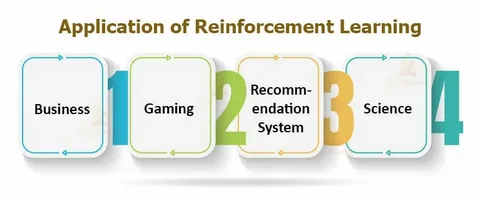Artificial Intelligence (AI) continues to reshape the business landscape, and one of its most impactful branches—Reinforcement Learning (RL)—is increasingly gaining ground. Unlike supervised learning, which relies on historical data and labelled examples, reinforcement learning teaches an agent to make decisions by interacting with its environment. The agent learns by trial and error, receiving feedback in the form of rewards or penalties. Over time, it develops optimal strategies to achieve its objectives.
For businesses, reinforcement learning provides a compelling framework for solving complex problems that require dynamic decision-making. From robotics to finance, from marketing optimisation to supply chain automation, RL is transforming traditional business models and workflows.
If you’re considering mastering this cutting-edge domain of AI, enrolling in a Data Science Course can be the first step toward building the skills necessary to implement RL in real-world scenarios.
What is Reinforcement Learning?
Reinforcement Learning is a type of machine learning where an agent learns to perform actions in an environment to maximise cumulative reward. The core components of RL include:
- Agent: The learner or decision-maker.
- Environment: The external system the agent interacts with.
- Actions: The set of all possible moves the agent can make.
- Rewards: Feedback received after acting.
- Policy: The strategy that the agent employs to determine its actions.
By exploring different strategies and learning from feedback, the agent gradually improves its performance. Unlike traditional models, RL doesn’t require labelled input/output pairs but learns optimal behaviour through experiences.
Key Algorithms in Reinforcement Learning
Businesses often rely on these popular RL algorithms:
- Q-Learning: A value-based method that helps an agent learn the best action to take given the current state.
- Deep Q-Networks (DQN): An extension of Q-learning that integrates deep learning to manage large, complex state spaces.
- Policy Gradient Methods: Algorithms that directly optimise the policy function instead of value functions.
- Actor-Critic Methods: Combine the benefits of value-based and policy-based approaches for more efficient learning.
Each of these algorithms offers different strengths and is suited for specific types of problems in business environments.
Practical Applications of Reinforcement Learning in Business
Let’s explore how RL is transforming key business sectors:
1. Supply Chain Optimisation
In logistics, RL is used to determine the most efficient routes, manage inventory levels, and reduce delivery times. RL models adapt to real-time changes like traffic patterns or demand fluctuations, optimising operations continuously.
2. Personalised Marketing and Recommendation Systems
E-commerce and content platforms use RL to personalise user experiences. The agent learns from user interactions and tailors recommendations accordingly. For example, Netflix or Amazon uses RL to determine which movies or products to showcase, improving customer satisfaction and increasing sales.
3. Automated Trading in Finance
Reinforcement learning is highly suited for algorithmic trading. The agent learns from past market behaviour and attempts to predict and react to future market conditions. It continuously adjusts strategies based on rewards like returns or reduced risk, offering a sophisticated edge in stock trading.
If you’re passionate about integrating such AI-driven strategies into your business or career, joining a Data Science Course with hands-on RL training can provide a crucial foundation.
4. Dynamic Pricing
RL can optimise pricing strategies in sectors like travel, e-commerce, and retail. By learning how customers react to different price points in real-time, the algorithm adjusts prices dynamically to maximise revenue and market share.
5. Customer Support Automation
AI-powered chatbots and virtual assistants leverage RL to improve their responses. Over time, these systems learn how to handle complex queries better, reduce handling time, and increase customer satisfaction.
6. Energy Management
In smart grids and industrial operations, RL helps manage energy distribution, reduce consumption, and maintain balance across systems. Businesses can optimise energy usage and reduce operational costs using RL-driven automation.
7. Robotic Process Automation (RPA)
Manufacturing units use RL to train robots to perform repetitive tasks more efficiently. Robots can learn from mistakes and improve assembly line accuracy and productivity, minimising human intervention.
For aspiring professionals in AI, a data scientist course in Hyderabad can help unlock these capabilities. Such programs typically offer practical training in reinforcement learning, equipping learners to implement these techniques in real-world scenarios.
Challenges in Implementing RL in Business
Despite its potential, businesses often face challenges when implementing RL systems:
- Data Scarcity: RL often requires extensive exploration, which might not be feasible due to limited real-world data.
- High Computation Cost: RL models, especially those involving deep learning, demand considerable computational resources.
- Complex Reward Engineering: Designing a proper reward structure is critical. Misaligned rewards can lead to undesired behaviour.
- Real-Time Adaptation Risks: In high-stakes domains like finance or healthcare, making decisions in real-time with uncertain data can be risky.
To overcome these challenges, businesses should invest in building strong internal AI capabilities or partner with external experts.
Future of Reinforcement Learning in Business
As computational power increases and access to data improves, RL applications in business are expected to grow rapidly. Advances in simulation environments and digital twins are making it easier to train RL agents safely before deployment in the real world.
Industries like retail, logistics, healthcare, and finance will continue to harness the potential of RL for smarter decision-making and efficiency. Moreover, the emergence of multi-agent reinforcement learning—where multiple agents learn and cooperate—can open new possibilities for collaborative business strategies.
Conclusion
Reinforcement learning is not just an academic concept—it’s an actionable, scalable solution that’s reshaping how modern businesses operate. From personalised customer interactions to autonomous operations, the use of RL is accelerating innovation across sectors.
For those eager to be at the forefront of this AI revolution, enrolling in a data scientist course in Hyderabad is a strategic step. Such training can empower professionals with the knowledge and tools to build intelligent systems capable of learning, adapting, and evolving in real-time.
By understanding and applying reinforcement learning, businesses and professionals alike can stay competitive in an increasingly AI-driven world.
ExcelR – Data Science, Data Analytics and Business Analyst Course Training in Hyderabad
Address: Cyber Towers, PHASE-2, 5th Floor, Quadrant-2, HITEC City, Hyderabad, Telangana 500081
Phone: 096321 56744




